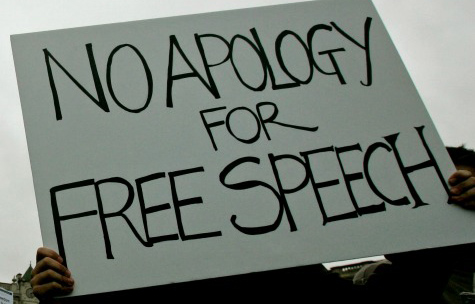
It is now possible in American law, under the cover of “victim relief,” to create new victims by depriving them of their freedom of speech.
In the Commonwealth of Pennsylvania, House Bill HB2533 and Senate Bill SB508, the Revictimization Relief Act, was passed in mid-October, fast-tracked to the governor’s desk, and signed into law by Governor Tom Corbett on Oct. 21 (as of the beginning of next year he will be ex-governor). This new law would silence all Pennsylvania prisoners if, by exercising their right to free speech, they allegedly cause “mental anguish to their victims.”
The international Call to Action opposing this new legislation, signed by numerous civil rights organizations and leaders, recounts the history of the law. “This legislation emerged as a politically charged response on the part of the Fraternal Order of Police and its political allies, because they failed to stop Pennsylvania prisoner and radio journalist Mumia Abu-Jamal from delivering his Oct. 5, 2014, commencement address at Goddard College in Vermont, from where Abu-Jamal earned his B.A. in 1996 while on death row. Students at Goddard collectively chose Abu-Jamal as their commencement speaker and the administration supported the invitation. In this case, this law would deny the school the right to hear from its alum, Abu-Jamal.”
Mumia Abu-Jamal delivered his address by video.
The Call adds that “the law affords virtually unlimited discretion to district attorneys and the attorney general to silence prisoner speech…[and] targets both prisoners’ speech and supporters who sponsor that speech.” Legislators, and the governor, have claimed powers that would be extremely difficult for citizens to challenge and check.
How should “victim relief” be achieved? “By just verdict and the extension of due process to all parties involved,” says the Call. In a climate where large numbers of people are imprisoned, many of them poor and people of color, what redress is left to reverse wrongful convictions and harsh sentences except to freely exercise constitutionally guaranteed freedom of speech?
Indeed, could the current debate over mass incarceration have been engaged without prisoners themselves “exposing systemic violations of their rights in the courts?” From now on, might a prisoner speak out about conditions behind the prison walls and be subject to a retaliatory civil suit?
The new Pennsylvania law not only attempts to block Abu-Jamal’s free speech, but that of all prisoners in Pennsylvania on the hypothesis that “someone” could be hurt and offended by a prisoner’s voice or words heard in public. The law is tantamount to locking people up and tossing the key into the Schuylkill River.
The First Amendment exists not just to protect speech we agree with, but also that which might offend and challenge us. This is the legal morass into which the Pennsylvania legislators and governor have stepped. The issue also has resonance in the current national wave of laws and policies mandating that teachers and professors post “warnings” that certain courses, or certain units, might be offensive to some students. Better alert those vulnerable high school sophomores that the biology teacher might try to explain evolution – or worse, the human reproductive system! Or that the college prof in Middle East Studies might care to say something about the illegality of Israeli settlements in the West Bank!
The Call denounces “the increasingly ominous display of rogue state power in Pennsylvania.” The American Civil Liberties Union of Pennsylvania has taken up the challenge to the law.
Among the signers of the Call to Action Against the Silencing of Constitutionally Protected Prisoner Speech in Pennsylvania are several defense groups for Mumia Abu-Jamal, as well as his literary agent Frances Goldin, the Prison Action Network, the Center for Constitutional Rights, National Lawyers Guild, Cornel West, and the International Committee for the Freedom of the Cuban 5.
On Nov. 16, the National Writers Union UAW Local 1981 passed a resolution to sign the Call to Action at its National Executive Board meeting held in New York City. “The National Writers Union believes in the right of all people and members of all communities, especially those that are oppressed, including prisoners, to practice journalism and to write and express themselves in their own words, in addition to having their stories told by outsiders.”
Affirming “the free flow of information in society,” the NWU resolution also points out that Mumia Abu-Jamal “was invited to become an honorary member of the National Writers Union in 1995 when the state of Pennsylvania first tried to put him to death, and has since received the support of the union over the years as an exemplary broadcast journalist and author who tells the truth about the prison-industrial complex from behind the walls.”
Eric A. Gordon is a member of the National Writers Union.
Photo: AP

MOST POPULAR TODAY

Zionist organizations leading campaign to stop ceasefire resolutions in D.C. area


High Court essentially bans demonstrations, freedom of assembly in Deep South

Afghanistan’s socialist years: The promising future killed off by U.S. imperialism

Communist Karol Cariola elected president of Chile’s legislature






Comments